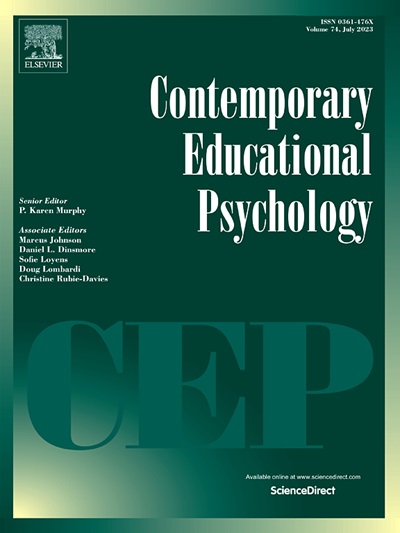Unpacking Student Responses to Discrepant Peer and Teacher Feedback: A Cross-National Comparison
IF 3.8
1区 心理学
Q1 PSYCHOLOGY, EDUCATIONAL
引用次数: 0
Abstract
In this experimental study we investigated the influence of discrepant feedback from teachers and peers on emotional responses and feedback appraisals in a sample of university students. A total of 753 tertiary education students from the United States (N = 172), New Zealand (N = 217), and Spain (N = 364), were presented with a scenario wherein they received two (discrepant) feedback messages that varied in terms of their focus and tone (suggestive/neutral vs. evaluative/positive). In the two conditions, the source of feedback was also manipulated. In condition one, participants saw that the teacher offered evaluative/positive feedback, with peers offering suggestive/neutral. In contrast, in condition two, the peer offered evaluative/positive message while the teacher provided suggestive/neutral. The findings from repeated measures ANOVA, cumulative models, and logistic regression revealed a clear preference among students for feedback from teachers over peers, regardless of the message’s focus and valence. Positive evaluative messages were found to elicit higher positive emotions. Interestingly, even when peer feedback was viewed as having advantages, students reported higher positive emotions and were more receptive of teacher feedback. These results were consistent across countries, although our findings did reveal country-specific patterns. These insights have practical implications for targeted training on feedback provision, highlighting the pedagogical value of peer feedback and offering important insights to engage students with diverse feedback sources.
拆解学生对不同同伴和教师反馈的反应:一项跨国比较
在本实验研究中,我们以大学生为研究对象,探讨了师友反馈差异对大学生情绪反应和反馈评价的影响。共有753名来自美国(172名)、新西兰(217名)和西班牙(364名)的高等教育学生被呈现在一个场景中,他们收到了两种(不同的)反馈信息,这些反馈信息在焦点和语气方面各不相同(暗示/中性vs.评价/积极)。在这两种情况下,反馈源也被操纵。在条件一中,参与者看到老师提供了评价性/积极的反馈,而同伴提供了暗示性/中性的反馈。相比之下,在第二种情况下,同伴提供了评价/积极的信息,而老师提供了暗示/中性的信息。重复测量方差分析、累积模型和逻辑回归的结果显示,无论信息的焦点和效价如何,学生对教师反馈的偏好明显高于同伴反馈。研究发现,积极的评价信息会引发更高的积极情绪。有趣的是,即使同伴反馈被视为有优势,学生们也报告了更高的积极情绪,更容易接受老师的反馈。这些结果在各国都是一致的,尽管我们的发现确实揭示了各国的具体模式。这些见解对有针对性的反馈提供培训具有实际意义,突出了同伴反馈的教学价值,并为让学生参与各种反馈来源提供了重要见解。
本文章由计算机程序翻译,如有差异,请以英文原文为准。
求助全文
约1分钟内获得全文
求助全文
来源期刊

Contemporary Educational Psychology
PSYCHOLOGY, EDUCATIONAL-
CiteScore
16.50
自引率
3.90%
发文量
74
期刊介绍:
Contemporary Educational Psychology is a scholarly journal that publishes empirical research from various parts of the world. The research aims to substantially advance, extend, or re-envision the ongoing discourse in educational psychology research and practice. To be considered for publication, manuscripts must be well-grounded in a comprehensive theoretical and empirical framework. This framework should raise critical and timely questions that educational psychology currently faces. Additionally, the questions asked should be closely related to the chosen methodological approach, and the authors should provide actionable implications for education research and practice. The journal seeks to publish manuscripts that offer cutting-edge theoretical and methodological perspectives on critical and timely education questions.
The journal is abstracted and indexed in various databases, including Contents Pages in Education, Australian Educational Index, Current Contents, EBSCOhost, Education Index, ERA, PsycINFO, Sociology of Education Abstracts, PubMed/Medline, BIOSIS Previews, and others.
 求助内容:
求助内容: 应助结果提醒方式:
应助结果提醒方式:


